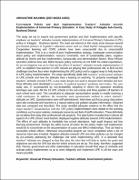| dc.description.abstract | ARINAITWE MAXIMA (2007-MO53-10003)
Government Policies and their Implementation: Teachers’ Attitudes towards
Implementation of Universal Primary Education: A Case Study of Kitagata Sub-County,
Bushenyi District
The study set out to inquire into government policies and their implementation with specific
emphasis on teachers‟ attitudes towards implementation of Universal Primary Education (UPE)
policy in Kitagata – Bushenyi district. The need and interest in this study arose because several
government policies in Uganda‟s education sector such as; Head teacher management training,
Cooperative learning and COPE schools have been unsuccessful due to unsuccessful
implementation. This is as a result of poor implementation strategy, inadequate communication
about policy and implementation, resource constraints, lack of sustainability plans, negative
attitude by clients and key implementers, bureaucratic and administrative factors. Most African
education policies have also failed because policy outcomes do not fulfil the initial expectations.
So an investigation was set to find out the effect of teachers‟ attitudes towards implementation of
UPE, to establish how teachers in UPE schools are playing their professional role, to find out the
challenges teachers face when implementing the UPE policy and to suggest ways to help teachers
in UPE policy implementation. The study specifically dealt with teachers‟ professional attitudes
in UPE schools and how the attitudes have a bearing on teaching. To properly investigate the
teachers‟ attitudes towards UPE, a case study design was used to measure their attitudes and how
those attitudes were developed in teachers. It explored teachers‟ problems and wishes. The case
study was 17 accompanied by non-probability sampling in which the purposive sampling
technique was used. All the 23 UPE schools in the sub-county and three quarters of teachers in
each school were used. This constituted an adequate representative sample to enable reaching a
valid conclusion. In addition, the researcher used questionnaire method to solicit teachers‟
attitudes on UPE. Questionnaires were self-administered. Interviews and focus group discussions
were also conducted with teachers in a natural setting and yielded valuable information. Obtained
data was computed and described. The study revealed adequate evidence to the effect that the
major teachers‟ dissatisfaction with the UPE policy implementation were related to the working
conditions such as poor salaries, inadequate resources and lack of staff motivation. These definitely
do not allow them play their professional role properly. The data further revealed that in almost all
aspects of a UPE school, most teachers displayed negative attitudes towards UPE implementation.
The effect of such attitudes is inevitably low school attendance, high pupil dropout and low
learning achievement. Perhaps the safest course of action for the policy maker and implementer
would be to concentrate on the documentation of cause and effect relationships. That can lead to
successful school reform. Otherwise unsuccessful projects are never completed when a lot of
resources have been invested. Negative attitudes towards UPE and other policies can be changed
by pro-actively addressing the challenges met when implementing UPE. It is desirable that
teachers‟ attitudes are changed so that they play the roles that will help to realise the goals and
objectives not only for UPE but also for which schools are set up. The study, therefore, suggested
that: Parents, government and other stakeholders in education should find ways to motivate and
activate policy implementers so as to work diligently and implement UPE in all the ways and
means possible.
Keywords: Universal Primary Education, Teachers attitude, Governement policies | en_US |


